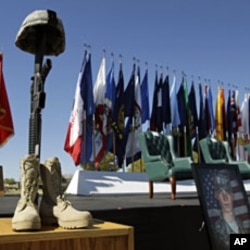It is widely agreed that the plot to mount terrorist attacks in the United States on Sept. 11, 2001 sprung from the mind of Osama bin Laden. But less certain is his role after U.S. forces routed bin Laden and his followers from their sanctuaries in Afghanistan later that year. In the intervening years since 9-11, U.S. and Western intelligence agencies took the view that al-Qaida worldwide had become less centralized and more of a “franchise” operation. In this view, bin Laden was more of an inspirational than operational figure.
But some of the material gathered in the raid on bin Laden’s compound in Abbottabad, Pakistan, seems, at least at first glance, to challenge that view. Reports have surfaced of plots to blow up rail lines and exhortations by bin Laden to his followers to aggressively attack American targets. Some American officials were quoted as calling the compound a “command and control center”.
Footage shot by VOA Urdu service of the scene outside the compound where bin Laden was killed.
Re-evaluation
Shaun Gregory, director of the Pakistan Security Research Unit at the University of Bradford in England, says there is a re-evaluation going on inside Western intelligence agencies of what they know - or thought they knew - about bin Laden and al-Qaida.
"If I’ve heard one pretty consistent thing from colleagues on both sides of the Atlantic it is the creeping evidence that he was rather more, if you like, in the loop than people had suspected for many years," said Gregory.
But, he adds, the original view that bin Laden was not directly managing terrorist operations seems to be reinforced.
"But then I’m now hearing a back current saying that he may have, if you like, been in greater contact with people, but he’s not a strategic mastermind, he’s not a military planner in that sense, and maybe his role is a bit closer in a sense to [Mullah] Omar’s role with respect to the Afghan Taliban," Gregory said.
Not a hands-on leader
Analysts say closer evaluation of the material that has surfaced so far in fact confirms the long-held view that bin Laden was in fact not a hands-on operational leader. Paul Pillar, a longtime CIA veteran and former National Intelligence Officer for the Near East and South Asia, says bin Laden had plenty of ideas but they did not reach the plotting stage.
"If you look really closely at what has come out so far, I don’t think that it changes the overall perception of the role that bin Laden had been playing over the last few years - a perception shared by most experts - and that would be one in which he was not out of the operational business entirely by any means, but his principal role was one of publicist, ideologist, source of ideology, symbol," Pillar said.
Analysts say counterterrorism operations had squeezed al-Qaida by arresting or killing mid-level leaders and monitoring their communications. Moreover, Pillar points out, many of the post-9-11 terrorist incidents or plots, such as the Times Square bomber, Faisal Shahzad, and the Fort Hood shooter, Major Nidal Hassan, were plotted outside of what intelligence officers have come to call “Al-Qaida Central.”
"It’s not just a theory but a fact that’s been accumulating over the last few years that most of the initiative and the direction and the planning and the training have taken place away from the al-Qaida Central and on the periphery," Pillar said.
Ayman al-Zawahri: Osama's successor?
The leading candidate to replace bin Laden is his deputy, Ayman al-Zawahri. But analysts say he is expected to face opposition. Al-Qaida, with its franchises in Yemen and elsewhere, is not a monolithic organization. Jeremy Binnie, a terrorism analyst with IHS Jane’s, says that without bin Laden, al-Qaida franchises may increasingly focus on local goals than the global goals espoused by their late leader.
"There are these people with a different vision of al-Qaida," said Binnie. "Zawahri is going to have to try to step in there. His ability to fill bin Laden’s shoes as sort of a figure that everyone defers to and refers to as the ‘great sheik’ and has that kind of gravitas [eminence] - it’s going to be very difficult to replace him [bin Laden] in that respect.
As Paul Pillar points out, the death of bin Laden does bring a kind of catharsis to Americans for the 9-11 attacks, but it is far from being a death blow to al-Qaida or jihadist terrorism.

